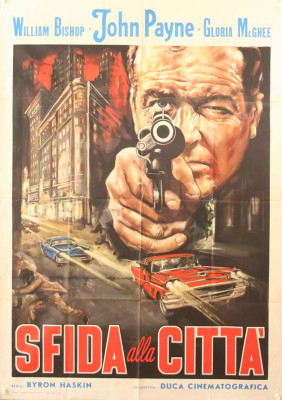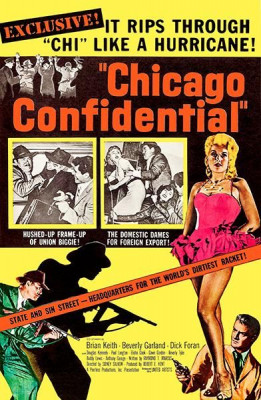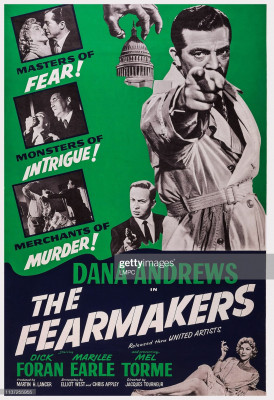| Reviews & Columns |
|
Reviews DVD TV on DVD Blu-ray 4K UHD International DVDs In Theaters Reviews by Studio Video Games Features Collector Series DVDs Easter Egg Database Interviews DVD Talk Radio Feature Articles Columns Anime Talk DVD Savant Horror DVDs The M.O.D. Squad Art House HD Talk Silent DVD
|
DVD Talk Forum |
|
|
| Resources |
|
DVD Price Search Customer Service #'s RCE Info Links |
|
Columns
|
|
|
Film Noir: The Dark Side of Cinema VII [The Boss / Chicago Confidential / The Fearmakers)
Political corruption ties together all three entries in Film Noir: The Dark Side of Cinema, Volume VII, with all three from the United Artists catalog: The Boss (1956), Chicago Confidential (1957), and The Fearmakers (1958). As before, the labeling of some of these titles as "noir" is debatable, but it's a good mix. One is intriguing for its ethical issues, another boasts a fine cast, and the third, despite a fatally miscast lead, is a valiant effort.
The Boss is a historical drama of political corruption with the main character, Matt Brady (John Payne), closely based on Kansas City political boss Tom Pendergast. The film has its admirers, but I found Payne so badly miscast and unable to convincing play the part that I found suspending disbelief impossible. Ben Perry is credited with the screenplay, which was actually written by the blacklisted Dalton Trumbo.
In 1919, Matt Brady triumphantly returns home from the war, greeted by his older brother, Tim (Roy Roberts), the political mover and shaker of his medium-size Kansas city. Tim is anxious to have Matt join him in local politics, but Matt wants to make his own way in life, despite being more than little rough around the edges. Indeed, that very night Matt gets drunk, is beaten up in a barroom brawl, upsets his sweetheart, Elsie Reynolds (Doe Avedon), and in inebriated surliness picks up sloppy seconds, an "old maid" named Lorry Reed (Gloria McGehee), Matt insisting they get married. She's hesitant, and despite insulting her twice, arguing a) she's not pretty enough to be a prostitute; and, b) she's so ugly she has nothing to lose, they do, in fact, marry that night. Predictably, Matt has buyer's remorse the next morning, but is too pigheaded and prideful to divorce her.
When an outraged Tim shows up at their room and promptly dies in the lobby of the building (apoplexy?), Matt assumes Tim's position, quickly becoming boss of the entire city. Matt's old friend, Bob Herrick (William Bishop), fresh out of law school, becomes Matt's attorney, retained partly because Matt is still in love with Elsie, now married to Bob. Much of what follows has faint echoes of Citizen Kane: the unhappily married Lorry drowns in wealth and loneliness from her unloving yet controlling husband; Matt's power, wealth, and influence rises and falls; he's betrayed by his closest friend, etc.
John Payne is remembered today mainly as the attorney who convinced the world that Kris Kringle is the one, the only Santa Claus in Miracle on 34th Street (1947), but before that he was known primarily for his appearances in Technicolor Fox musicals. Unhappy at that studio, he went independent after Miracle, alternating between film noir, swashbucklers and other adventure films, but most especially Westerns, for which he was best known during the 1950s. He was a very likeable, intelligent actor, but here asked to play a vulgar one flaunting his wealth and influence with no redeeming features, a Donald Trump type (despite the film's half-hearted bid for sympathy for him near the end). It's the kind of part James Cagney and Edward G. Robinson expertly played in scores of films, but Payne just has no handle on the character. He scowls throughout (I don't recall him ever smiling once) and affects a gravelly, petulant manner, looking like a man unhappily suffering from a mildly painful case of kidney stones. It's the kind of unpleasant protagonist audience can't like much, so the actor better make him interesting, as Broderick Crawford did in All the King's Men but which Payne can't manage. A different, not necessarily better actor (Gene Evans comes to mind) might have pulled it off.
Conversely, from an acting perspective, Gloria McGehee is fine as Brady's unhappy wife, but here the part presents a different kind of problem: the character is supposed to be singularly ugly, but is played by an actress that, at worst, is simply unglamorous (as opposed to Doe Avedon, a former model). The way everyone in the film talks about her, you'd think she was Edith Massey. Again, a different actress seems called for, a Mercedes McCambridge type.
The one actor that does come off especially well is Joe Flynn as Ernie Jackson, a thinly-disguised Harry S Truman. Flynn looks the part, and is so good it's surprising his performance seems to have little impact on his career, which didn't pick up steam until some years later.
Director Byron Haskin keeps things moving, but the film's limited budget noticeably comprises things during the last act. A big climatic scene takes place on a massive staircase at "Union Station," obviously a soundstage set done on the cheap. The art direction is intended to suggest heavy marblework and the like, but the set looks like painted plywood. (***)
Chicago Confidential is a routine political corruption thriller but solidly constructed, worthwhile for its veritable galaxy of actors busy in the late-‘50s in low-budget features, on television, and occasionally in smaller parts in bigger, A-films. The main titles credit "Raymond T. Marcus" with the screenplay, but that was actually a front for blacklisted writer Bernard Gordon, named by actor-turned-producer William Alland. As Raymond T. Marcus, Gordon wrote program pictures made to order, generally for Columbia. (Gordon no doubt got this assignment from producer Robert E. Kent, a writer for Sam Katzman's B-unit at Columbia.) Gordon later worked anonymously under another writer-producer, Philip Yordan, in Spain on several Samuel Bronston epics, including 55 Days at Peking (1963), Gordon's biggest and best work. A decade later Gordon himself turned producer, most famously the cracklin' thriller Horror Express (1972).
In Chicago Confidential, union treasurer Mickey Partos (John Morley), acting on behalf of Artie Blaine (Dick Foran), president of the Workers National Brotherhood, nervously contacts district attorney Jim Fremont (Brian Keith), a rising star in Chicago politics, claiming to have proof that racketeers are attempting a takeover of the union.
However, en route to Freemont's home, Partos is murdered, with Blaine's gun planted at the crime scene under orders from Ken Harrison (Douglas Kennedy), the union's ambitious, corrupt vice-president, himself working under former Al Capone attorney Alan Dixon (Gavin Gordon). However, a drunk named "Candymouth" Duggan (Elisha Cook, Jr.) finds the gun and turns it in, forcing the mobsters to sober him up and rehearse Candymouth with false testimony that he saw Blaine leave the murder scene.
At the trial, Blaine's fiancée, Laura Barton (Beverly Garland), insists Blaine was with her at the time of the murder and, further, a neighbor, Sylvia Clarkson (Beverly Tyler), also saw Blaine there. Freemont, however, is sent a tape recording of Blaine's voice, actually made by a voice impressionist, believed by prosecutors used to establish a false alibi, while Dixon's torpedoes threaten Clarkson into changing her story. Blaine is found guilty and sentenced to die in the electric chair.
Laura, however, pesters Freemont into reexamining the case, and when he compares a new recording of Blaine's voice with the recording, and a sound expert concludes they are not the same person, Freemont begins to have doubts about Blaine's guilt.
Besides Keith, Garland, Foran, Cook, et. al., in leading parts, more familiar faces play supporting and minor roles. Phyllis Coates, unjustly unbilled, plays Freemont's intelligent, supportive wife; John Hamilton, another Adventures of Superman veteran, plays Blaine's defense attorney, while Thomas Browne Henry turns up as the trial judge. Jack Lambert, whose sneering, almost comic book-villain features typecast him as bad guys (especially in Westerns), also unjustly goes unbilled as the main assassin. Asa Maynor has a prominent part as a pushy, alcoholic bar girl plying her trade at Henry Rowland's dive bar.
Star Brian Keith was just beginning to establish his unusual screen persona, so laid back and underplayed Keith often played scenes like he had just woken up, yet there was always a kind of natural realism and improvisational quality unusual in actors of his generation. More conventional but even better is Beverly Garland as Blaine's determined fiancée. It's a meaty role for the actress but, more importantly, well-suited to her talents, she excelling as assertive, smart and determined women. (***1/2)
The Fearmakers (1958) is undeniably dated but thoroughly fascinating, less film noir than a societal issue/political thriller film. Dana Andrews, collaborating with director Jacques Tourneur for the third and last time (and following the classic Night of the Demon) stars as Alan Eaton, a Korean War veteran who'd been captured and tortured as a P.O.W. After a long hospital stay and still suffering from what we'd now call post-traumatic syndrome disorder, he flies back to Washington D.C. to check-in with his old office, a public relations-opinion research firm he co-founded. En route, Eaton finds himself seated next to a nuclear scientist, Dr. Gregory Jessup (Oliver Blake), who expresses the need to educate the public about the dangers of the nuclear arms race much like the medical community is ramping up its campaign against cigarette smoking (then picking up considerable steam).
Eaton finds that his modest firm has grown exponentially while he was missing in action. To his shock, however, he learns that his partner, using the power of attorney Eaton gave him while in the service, sold the business to Jim McGinnis (Dick Foran), and died in an apparent hit-and-run soon after. Nevertheless, McGinnis is eager to welcome Eaton back into the fold, partly for his valuable political contacts. However, secretary Lorraine Dennis (Marilee Earle) and "drone" employee (as McGinnis insultingly calls him) Barney Bond (Mel Tormé) act skittish around Eaton.
Through an old friend of Eaton's, esteemed U.S. Senator Walder (Roy Gordon), and reporter Rodney Hillyer (Joel Marston), Eaton learns that McGinnis is skewing and perhaps even fabricating polling data to shape, rather than simply document, public opinion, to sell politicians and political issues to the general public. Eaton, shocked by this breach of ethics, decides to enlist sympathetic secretary Lorraine's aid in exposing McGinnis.
(Mild Spoilers) Sixty-four years later, the then-appalling notion that polling data could be so grievously skewed and falsified to deliberately mislead and shape public opinion is, in 2022 terms, quaint. "Why," Eaton exclaims at one point (I paraphrase), "you could manipulate data to make any outrageous claim seem true!" To say such practices are widespread now both Republican and Democratic circles would be an understatement; any random viewing of Fox News or MSNBC will provide countless examples of such now-accepted if unacknowledged practices. Intriguingly, though, is here McGinnis is working on behalf of communist infiltrators, though the movie itself isn't particularly anticommunist, as the heart of the story is the ethical issue, not who's pulling the strings. Yet there are interesting ironies throughout. For one thing, Dr. Jessup, in talking with Eaton about the dangers of the nuclear arms race and likening it to the dangers of smoking, would have been perceived in 1950s terms as dangerously defeatist and Jessup a communist sympathizer, which he literally turns out to be. Yet Jessup's remarks now seem perfectly rational. And the vaguely conservative train of thought here, that the types of ethical violations dramatized endanger the integrity of American politics, are today embraced most wholeheartedly by political conservatives.
Produced independently for release through United Artists, The Fearmakers was clearly made on a tight budget (probably $300,000 or less) but doesn't look it. On one hand, most of the picture takes place in the few sets representing the public relations firm, but there's also extensive second unit work in Washington D.C. that, until the climax at least, strenuously avoids picture-postcard views of famous monuments and the like, adding an air of verisimilitude.
Though at 49 Andrews is a bit old to be believed as an Army captain, his wearily inquisitive, everyman persona is a good match for the character while, contrastingly, Dick Foran is intriguingly cast against type, he nearing the end of a long run of playing breezy, likeable heroes, often in B-Westerns (and a good guy in The Boss). In The Fearmakers his role would have been disorienting for audiences; they weren't used to Foran playing such a forceful, unpleasant and manipulative character.
Having singer-songwriter Mel Tormé, "The Velvet Fog," play the mousy, lonely Barney, complete with eyeglasses with thick lenses, might seem like stunt casting, but Tormé had been acting occasionally in films and on television for some time, and likely was cast because of the similar character he recently played, the abused kid brother of Mickey Rooney, in the celebrated Playhouse 90 production of "The Comedian," written by Rod Serling and directed by John Frankenheimer. His is a very good performance. (****)
Video & Audio
Licensed to Kino Lorber by MGM, all three transfers, in 1.78:1, 1.85:1, and 2.00:1 widescreen, look great, though the title elements of each film is on the soft side. Likewise, the DTS-HD Master audio (2.0 mono) is generally strong on all three titles, and optional English subtitle are provided on these Region "A" discs, though there was a strange anomaly on The Boss, a thumping like a beating heart, around the 30-minute mark and again during the final reel.
Extra Features
Supplements include commentaries on The Boss and The Fearmakers by film historian Alan K. Rode.
Parting Thoughts
A well-rounded, thematically linked set, Film Noir: The Dark Side of Cinema VII is Highly Recommended.
Stuart Galbraith IV is the Kyoto-based film historian largely absent from reviewing these days while he restores a 200-year-old Japanese farmhouse.
|
| Popular Reviews |
| Sponsored Links |
|
|
| Sponsored Links |
|
|
| Release List | Reviews | Shop | Newsletter | Forum | DVD Giveaways | Blu-Ray | Advertise |
|
Copyright 2024 DVDTalk.com All Rights Reserved. Legal Info, Privacy Policy, Terms of Use,
Manage Preferences,
Your Privacy Choices | |||||||
















